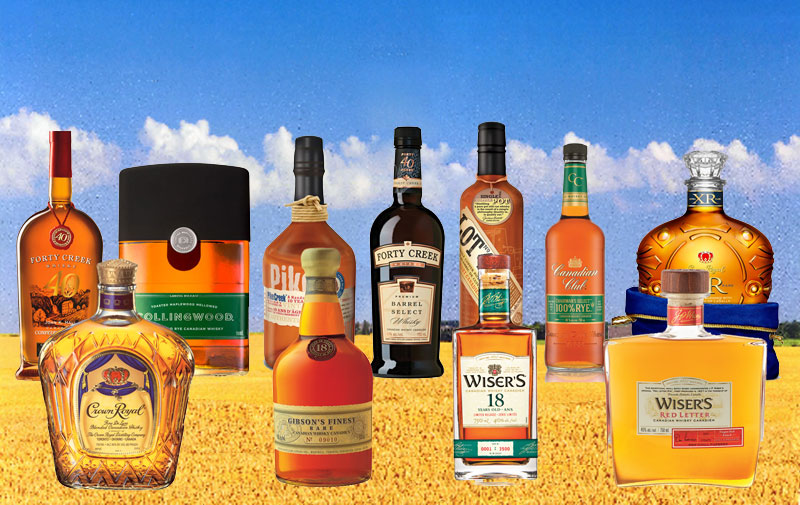Does Ontario want to kill off Canadian whisky?
Guest post by Jan H. Westcott
A new policy from the Ontario provincial government may accidentally kill Canadian whisky icons such as Canadian Club, Wiser's, Crown Royal, Gibson's and Forty Creek.
It will certainly reduce your choice as a consumer.
Spirits production isn't the biggest business in the province, but a study conducted a few years ago by Ontario's Ministry of Agriculture and Food determined that Ontario spirits businesses contributed about $1.5 billion to Ontario's economy and supported good, full-time jobs for some 6,000 Ontario families.
These spirits are made 100 per cent from grains grown by Ontario farmers. In fact, according to the Grain Farmers of Ontario, Ontario's distilled spirits producers are the 4th largest purchasers of corn in the province. They're still made here by your fellow Ontarians in communities like Windsor, Collingwood, Amherstburg, Brampton and Grimsby.
Recently, the media has been full of stories about the government moving to allow the sale of beer and wine in 200 to 300 new grocery store locations across Ontario. Although not formally announced by the government, these new selling opportunities would be provided to wine and beer (including foreign produced beer and wine) but would exclude Ontario-produced spirits.
Making the purchase of some kinds of alcohol more convenient than others will change the types of alcohol people drink, and dramatically reduce the amount of spirits sold in Ontario. We know this because we have seen it happen in Quebec.
Before the Quebec government decided to favour wine and beer producers by exclusively permitting them to be sold in grocery and corner stores, spirits were actually more popular with adult Quebec consumers. Indeed, prior to beer and wine being offered for sale in grocery stores, spirits held 40 per cent of the Quebec beverage alcohol market.
In the intervening period during which spirits have been sold only in liquor stores versus beer and wine selling in grocery stores, spirits sales declined dramatically and today hold only a scant 13 per cent of the Quebec beverage alcohol market. This has resulted in the closure of Quebec distilleries and the loss of hundreds of jobs.
Even more difficult to understand is the notion that the Ontario government will provide foreign beer and wine better access to Ontario consumers than it affords products made here by its own citizens from grains grown by Ontario farmers.
This policy will also cost the government money, forcing them to find it somewhere else.
Most consumers don't know that the vast majority of what they pay for their favourite bottle of spirits is tax with most of that taken by the provincial government. And, spirits are taxed at far higher rates than are beer and wine, even when they contain exactly the same amount of alcohol.
For example, a bottle of Wiser's Deluxe Canadian whisky made in Windsor from grain grown in Essex, Lambton and Kent counties is sold to the LCBO for $6.35. Ontarians pay $27.25 for that same bottle at the LCBO and, of the $20.90 increase, $16.14 (77 per cent) goes to the LCBO and the provincial government.
Of the $1.7 billion directly transferred to the Ontario treasury by the LCBO each year, nearly 60 per cent comes from the sale of spirits.
The exclusion of spirits is also puzzling given that Ontario already sells beer, wine and spirits in grocery stores across the province in smaller communities through the LCBO's agency store program and has successfully done so for many years. These Ontario residents (and cottagers) are used to having their choice of beverage alcohol available on grocery store shelves without the artificial restriction of government policy.
Some will say this is justified because spirits are somehow different from beer and wine. However, the facts show this is not the case.
In response to the very specific question as to whether or not beer or wine is safer to drink than the pejoratively described "hard liquor," the U.S. Centre for Disease Control and Prevention's answer is categorical: "No. One 12-ounce beer has about the same amount of alcohol as one 5-ounce glass of wine, or 1.5-ounce shot of liquor. It is the amount of alcohol consumed that affects a person most, not the type of alcoholic drink." MADD agrees.
In excluding spirits from grocery store sales and from participating in the subsequent changes that will inevitably take place, Ontario will needlessly squander an industry that has generated economic activity and jobs for generations of Ontario citizens, cost the government revenue when the deficit is high, and make buying spirits more inconvenient.
Beer and wine in grocery stores may sound like a good thing, but hurting Ontario distillers to advantage foreign beer companies is a bad idea.
Jan H. Westcott is President and CEO of the Association of Canadian Distillers.


